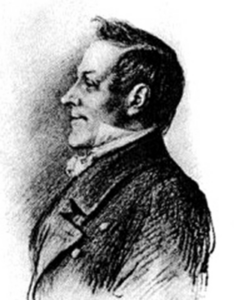To my friends
(Poet's title: An die Freunde)
Set by Schubert:
D 654
[March 1819]
Im Wald, im Wald da grabt mich ein,
Ganz stille,ohne Kreuz und Stein,
Denn was ihr türmet, überschneit
Und überrindet Winterszeit.
Und wann die Erde sich verjüngt
Und Blumen meinem Hügel bringt,
Das freut euch Guten, freuet euch,
Dies alles ist dem Toten gleich.
Doch nein, denn eure Liebe spannt
Die Äste in das Geisterland,
Und die euch führt zu meinem Grab,
Zieht mich gewaltiger herab.
In the forest, in the forest, that is where you should bury me,
In total silence, without any cross or stone:
Since the heap that you are making will be covered with snow
And ice by the winter weather.
And when Earth rejuvenates itself
And brings flowers to my mound,
Then rejoice, good people, rejoice!
It is all the same to the dead.
But no – since your love spreads
Its branches into the land of the spirits,
And what leads you towards my grave
Pulls me more powerfully downwards.
All translations into English that appear on this website, unless otherwise stated, are by Malcolm Wren. You are free to use them on condition that you acknowledge Malcolm Wren as the translator and schubertsong.uk as the source. Unless otherwise stated, the comments and essays that appear after the texts and translations are by Malcolm Wren and are © Copyright.
☙
Themes and images in this text:
Branches The cross and crucifixes Covers and covering Flowers Friends Frost and ice Ghosts and spirits Graves and burials High, low and deep Noise and silence Pulling and dragging Rejuvenation Snow Spring (season) Winter Woods – large woods and forests (Wald)
‘Do not put up a memorial when you bury me in the woods,’ the poet tells his friends. Winter will only cover any cross or stone you erect with its snow and wind. The poet is addressing the unconscious human desire to fight the consequences of death by putting something above a grave. Christians use the cross (an instrument of death) as a promise of new life. Many traditions use stone, with its connotations of permanence, to hide as much as to mark the site of decomposition. These are both using the metaphor of UP IS HOPE / DOWN IS DESPAIR.
In the next stanza the poet challenges another cliched metaphor: that nature’s revival in spring and the blossoming of flowers on a grave might symbolise hope. He points out that any lift in the spirits is limited to the friends who see the flowers; the dead person in the grave is not affected.
He concedes that the love that has brought friends to visit his grave ‘lifts’ them into a spiritual dimension, but his own very exclusion from this experience ‘pulls him down even more forcefully’. The ‘up / down’ metaphor allows us to imagine a situation of increasing deadness. As time passes and the seasons change the friends and the dead man are pulled further apart (up and down respectively). So, it is not true that the dead person is not affected. He is ‘deader’, more distant from his friends.
☙
Original Spelling and note on the text An die Freunde Im Wald, im Wald da grabt mich ein, Ganz stille, ohne Kreuz und Stein: Denn was ihr thürmet, überschneyt Und überrindet Winterszeit. Und wann die Erde sich verjüngt, Und Blumen meinem Hügel bringt1. Das freut euch Guten; freuet euch! Dies alles ist dem Todten gleich. Doch nein, - denn eure Liebe spannt Die Aeste in das Geisterland: Und die euch führt zu meinem Grab, Zieht mich gewaltiger herab. 1 When Mayrhofer's poems were published in 1824, this line was 'Sie Veilchen meinem Hügel bringt' (they bring violets to my mound). It is impossible to know if Schubert made the change while setting the poem to music or whether he was working from an earlier draft of the text.
Confirmed by Peter Rastl with Gedichte von Johann Mayrhofer. Wien. Bey Friedrich Volke. 1824, page 50.
To see an early edition of the text, go to page 50 [62 von 212] here: http://digital.onb.ac.at/OnbViewer/viewer.faces?doc=ABO_%2BZ177450902


